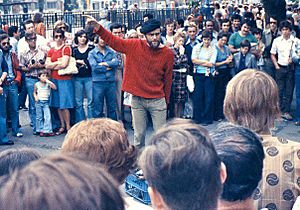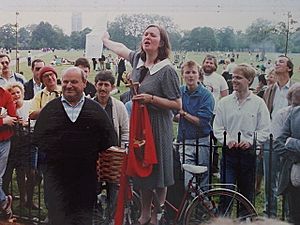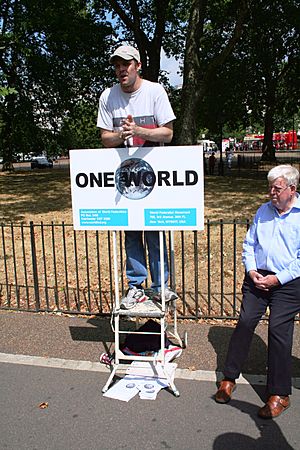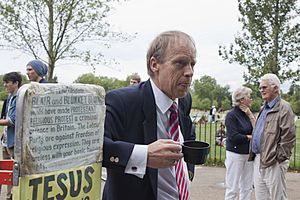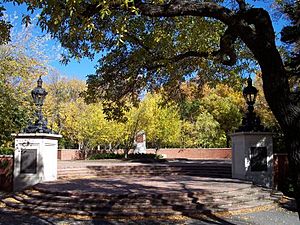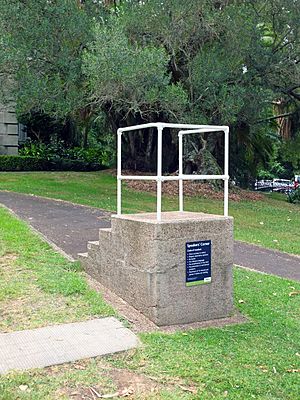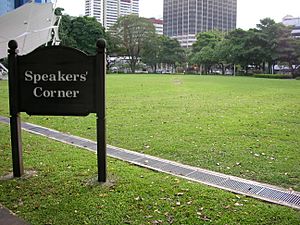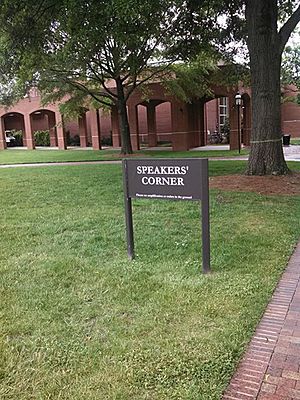Speakers' Corner facts for kids
A Speakers' Corner is a special place where anyone can speak freely outdoors. People can share their ideas, debate, and discuss different topics. The most famous Speakers' Corner is in Hyde Park in London, England.
Long ago, there were other Speakers' Corners in London parks. These included places like Finsbury Park and Victoria Park. Today, you can find Speakers' Corners in many other countries too.
Contents
Speakers' Corner in London's Hyde Park
At Hyde Park, speakers can talk about almost anything. Police usually only step in if someone breaks the law. There is no special protection from the law here. But in practice, police rarely stop speeches unless there is a complaint. Sometimes, they have stopped people for using bad language.
The main Speakers' Corner is near Marble Arch. However, the area for public speaking is actually much larger. It stretches from Marble Arch to Victoria Gate and along the Serpentine.
In the past, Hyde Park was a place for big protests. In 1855, people protested a law that stopped buying and selling on Sundays. Later, groups like the Chartist movement used the park. They gathered to demand more rights for working people. The Reform League held huge protests in 1866 and 1867. These protests helped more working-class men get the right to vote.
Speakers' Corner is a great example of freedom of speech. Anyone can show up and talk without planning ahead. But speakers might get interrupted by people in the crowd. Famous thinkers like Karl Marx and George Orwell used to visit this corner.
In 1972, three men were arrested after giving speeches there. They were Irish activists who spoke about a sad event in Derry. They faced serious charges but most were dropped. They were found guilty of saying things that could cause trouble. They received prison sentences.
A judge named Lord Justice Sedley spoke about Speakers' Corner in 1999. He said it shows how the law allows all kinds of opinions. He also said that freedom of speech includes ideas that are "irritating" or "provocative." As long as the speech does not cause violence, it is allowed. This ruling helped protect free speech in England. Before this, certain speeches were not allowed. These included rude language or insulting the Queen.
In the late 1800s, Speakers' Corner was one of the few places. It was where socialist speakers could meet and debate.
Well-Known Speakers at Hyde Park
Many groups and people have spoken regularly at Hyde Park. Here are some of them:
- The Socialist Party of Great Britain (since 1904)
- The Catholic Evidence Guild (since 1918)
- Vincent McNabb (around 1920–1943)
- Bonar Thompson (1920–1960)
- Frank Sheed (1921–around 1970)
- Philip Sansom (1947–around 1978)
- John Webster (1947–around 1985)
- Donald Soper, Baron Soper (1950–around 1995)
- Norman "The Walker" Schlund (1960s–1980s)
- Robert Ogilvie (1960s–1980s)
- Derek Prince (1970s)
- Jim Huggon (1970s, 1980s)
- Michael 'Lord' Barker (1970s, 1980s)
- Tony Allen (since 1978)
- Martin Besserman (since around 1978)
- Peter Lumsden (around 1980–2007)
- Heiko Khoo (since 1986)
- Diane Hamilton (since 1980s)
Speakers' Corners Outside London
Official Locations in the UK
Nottingham's Speakers' Corner
The first official Speakers' Corner outside London opened in Nottingham in 2009. It was opened by Jack Straw, a UK government official. This spot is in a new area of the city's Old Market Square. It includes a statue of Brian Clough, a famous football manager.
Lichfield, Staffordshire's Speakers' Corner
Speakers' Corner in Lichfield started in May 2009. Many people celebrated its opening. There were over 30 speeches, music, and dance. Today, it is a place for events and for people to share their thoughts. A plaque now marks the spot.
Worthing, West Sussex's Speakers' Corner
The town of Worthing in Sussex has had a Speakers' Corner for a long time. It is at Splash Point on the seafront. A sign marks the spot for "delivering sermons and public speeches." The Salvation Army has preached there since 1886. The area is being improved with a grant. It will have a platform with steps and a ramp for speakers.
Unofficial Locations in the UK
Leeds' Speakers' Corner
Leeds has its own Speakers' Corner at Victoria Gardens. It is in front of the Leeds Art Gallery. This spot is important for protests and marches. It is also used for war memorial services.
Newcastle's Speakers' Corner
The base of Grey's Monument in Newcastle is used as a stage. Musicians, preachers, and activists often speak there.
Speakers' Corners in Other Countries
Australia
Sydney has a Speakers' Corner in the Domain. It started in 1878. Speakers talk every Sunday afternoon. Free speech was first allowed in Sydney's Hyde Park in 1874. After a riot, it was decided in 1878 that the Domain would be the place for free speech.
A preacher named Robert Roberts wrote about Sydney's "preaching park" in 1896. He said it was unique because all religious groups used it. He noted that "Every denomination has its own tree."
Other Speakers' Corners are in Brisbane and Melbourne. In Melbourne, it is now called "Speakers' Forum." It is held outside the State Library of Victoria on Sunday afternoons.
Canada
Regina, Saskatchewan has a Speakers' Corner. It was dedicated in 1966. It reminds people about free speech and gathering rights. Two lanterns at the entrance came from the London Speakers' Corner. The platforms are from the old City Hall. They stand for free speech in local government.
Kitchener, Ontario also has a small Speakers' Corner. It is at the corner of King and Benton Street. It has been there since the mid-1980s.
Hong Kong
The City Forum is a public meeting held weekly in Victoria Park. Politicians and experts discuss current issues. The public can ask questions. Many secondary schools bring students to the forum. It is broadcast live on TV.
Indonesia
Large protests and speeches often happen at the Hotel Indonesia roundabout in Jakarta. This causes traffic jams. So, the government built a small park for demonstrations. It is called 'Taman Pandang Istana' (Palace-View Park). People often call it 'Taman Unjuk Rasa' (Demonstration Park).
Italy
In Lajatico, Pisa, there is a small Speakers' Corner. It is called "L'angolo del parlatore." It is open on Sundays for people to speak. The mayor was the first speaker. He talked about how important speaking and listening are for good local government.
Malaysia
The first Speakers' Square in Malaysia opened in George Town, Penang in 2010. It is open on Wednesday and Sunday evenings. Speakers are not allowed to use loudspeakers. They speak at their own risk. The government is not responsible for any legal issues.
Netherlands
In the Netherlands, Amsterdam has a Speakers' Corner called the Spreeksteen. It is open 24 hours a day for free speech. There are plans to put a camera and microphone there.
In 2006, a far-right activist spoke at the Spreeksteen. People who disagreed with him protested. They made noise to interrupt his speech.
New Zealand
There is a Speakers' Corner in Albert Park in Auckland. It is near the University of Auckland.
Singapore
Singapore opened its Speakers' Corner in 2000. It allows citizens to speak freely without a police permit. This is as long as they follow the rules.
The Speakers' Corner is in Hong Lim Park. This park was a popular place for political speeches in the 1950s and 60s. It is easy to reach by public transport.
In 2004, public shows and performances were also allowed there. Since 2008, citizens can also hold demonstrations without a permit. This change helps Singaporeans express their political views. Citizens register with the National Parks Board to use the corner.
Trinidad and Tobago
Woodford Square in Port of Spain, Trinidad, is known as "The University of Woodford Square." The first prime minister, Eric Williams, gave many speeches there. It is also called "People's Parliament." This name came from the Black Power movement in the 1970s. The square is near Trinidad's Parliament. It is still used for political speeches.
A blackboard in the square lists the day's topics. Speakers' topics are divided into "classes."
Thailand
An area for free speech was set up in Bangkok in the 1930s. It became known as Hyde Park. It allowed people to share political views. But the area was closed after student riots. It is not openly discussed today.
In 1955, Marshal Plaek Pibulsonggram visited London. He liked the Speakers' Corner in Hyde Park. When he returned to Thailand, he created a similar space in Bangkok. This helped political debate. But the government soon put limits on it.
United States
Tom L. Johnson, a mayor of Cleveland (1901–1909), set aside an area for free speech. It was in Public Square, like Hyde Park. Speeches and meetings were common there. Today, it is still a place for rallies and demonstrations.
The University of California, Berkeley had a free speech area until 1964. The University of Missouri has a "Speaker's Circle." It is one of only two such places in Missouri.
Elon University created a Speakers' Corner on its campus. Students can speak freely there at any time. They must not use loud speakers or cause trouble.
Washington Square Park (Chicago) was known as Bughouse Square. It was a free speech site from the 1910s to the 1960s.
The pedestrian area of Pennsylvania Avenue in Washington, D.C., has become a Speakers' Corner. People can generally speak freely in public places in Washington, D.C. But large organized protests need police permits.
Inspired by Speakers' Corner, the mayor of Nashville created a space for live music. It is in Centennial Park (Nashville). It is called Musicians Corner. A free concert series happens there every year.
Images for kids
See also
 In Spanish: Speakers' Corner para niños
In Spanish: Speakers' Corner para niños
 | Aaron Henry |
 | T. R. M. Howard |
 | Jesse Jackson |


